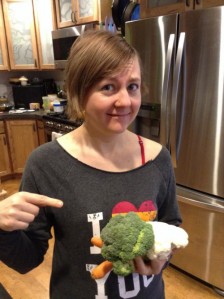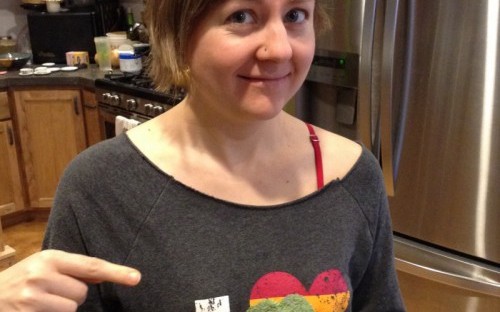 I don’t know about you, but I’ve had my time of “being vegan.” I was vegan twice. Once before my daughter was born (about 3 1/2 years ago for about a year) and then again a year and a half after my daughter was born. This second time, I realized my body didn’t thrive when I took meat and eggs out of my life, so it only lasted a few weeks. As much as I’d like to be vegan, I felt drained when I ate none of these products. And I’m proud of myself for recognizing this and following through, however, I am very conscious about where I get my meat and eggs. My brother, sent me an article that was posted on the internet recently about this topic and it inspired this post this week. You can check it out here. Basically, it’s saying that vegans are not the definition of vegan because the pesticides and fertilizers kill millions of insects. I think the author is hugely missing the point.
I don’t know about you, but I’ve had my time of “being vegan.” I was vegan twice. Once before my daughter was born (about 3 1/2 years ago for about a year) and then again a year and a half after my daughter was born. This second time, I realized my body didn’t thrive when I took meat and eggs out of my life, so it only lasted a few weeks. As much as I’d like to be vegan, I felt drained when I ate none of these products. And I’m proud of myself for recognizing this and following through, however, I am very conscious about where I get my meat and eggs. My brother, sent me an article that was posted on the internet recently about this topic and it inspired this post this week. You can check it out here. Basically, it’s saying that vegans are not the definition of vegan because the pesticides and fertilizers kill millions of insects. I think the author is hugely missing the point.
Firstly, no matter how someone chooses to eat, insects will probably be killed in the process. There are some ways to go around this (see below). This is why knowing your farmer is key. Ask them what they use and research their practices to make sure they align with your beliefs. I refuse to support the farmers who implement any practice that destroys our environment and/or allows torture in any way (by keeping them confined in tiny spaces, not giving them the freedom every living thing deserves like fresh air and quality diet, and the respect from being beaten, mutilated, and abused. Think about it, if we are supposed to be gaining energy and health from our food to thrive, we need to be eating things that are grown and raised in the healthiest ways. To me, the worst ways we are treating animals, is by supporting factory farmed animals from being raised and purchased, especially dairy, eating fois gras and veal.
Dairy cows are kept in buildings where they are made to produce more than twice as much more than was expected of them over four decades ago. These poor animals are tortured, violated, detached from their offspring, and milked in order to supply consumers with milk, cheese, butter, and so on. In 2012, the Food and Water Watch’s analysis of the USDA Census of Agriculture (for the remainder of this article, I will refer to them as FWW) found that over 5.5 MILLION cows were held captive in factory farmed warehouses. These poor animals are not only too frequently being milked, which hits home to me after having to pump milk for my one child for almost 2 years, albeit I only had to pump 3 times a day, they are forced to constantly be pregnant to produce milk. I couldn’t imagine how awful these cows feel being pumped to the point of infection every day for the 3-5 years of their short lives (normal lifespan is about 20 years), with no sun and being pumped with hormones, wounds forming on their teets and contaminating the milk with blood and pus.
http://abcnews.go.com/Blotter/video/undercover-video-cow-dehorning-9660948
Veal are baby cows who are confined to small crates where they aren’t allowed sunlight or any type of movement to make their meat super tender. And foix gras… these are the livers from ducks who are force-fed through a tube to fatten them up, making the liver a delicasy. Now, I love food as much as the rest of you all, but I cannot justify this type of suffering just so I can get a meal. That means, I don’t eat meat when I eat out unless they support farmers who treat their animals with respect and I choose to line the pockets of compassionate farmers by buying animal products from those I trust. (See local resources to find good farmers)
Friendly farming practices:
- Companion planting – this practice focuses on using plants or essential oils to deter pests from destroying crops (examples: marigolds and garlic)
- Barriers – this includes netting and fences and mostly used for bigger animals, rather than insects, though they are still getting in on eating crops
- Insects – this is the circle of life anyway, so why not? Common insects used are lady bugs and praying mantis.
Secondly, anytime someone chooses not to eat this way, they are not only saving an animal from being tortured and slaughtered for their own benefit, they are also aiming to improve the environment. Factory farming makes a huge environmental impact due to animal waste, which leads to pollution of the air, water and land, and ultimately, the welfare of other animals and humans.
“The EPA admits that it doesn’t even know where all of the factory farms are!”
The FFW also found that the waste from these slaved animals produced around 369 million tons of manure just in 2012.That is about 13 times more than what all of the humans in the US produced that same year, yet our waste is treated. While on the other hand, these mega-farms hold so much livestock that the waste pours into nearby streams and down to the groundwater. The side effects to humans range from “skin rashes, breathing problems, and headaches, and long-term exposure can lead to neurological problems. For children, senior citizens and adults with other health problems, exposure to these fumes can cause even more problems,” from the exposure of hydrogen sulfide, ammonia and methane gasses.
“United Nations Food and Agriculture Organization, the livestock sector generates more greenhouse gas emissions as measured in CO2 equivalent – 18 percent – than transport.”
“Of all the agricultural land in the U.S., 80% is used to raise animals for food and grow grain to feed them—that’s almost half the total land mass of the lower 48 states (“Major Uses of Land in the United States” by Marlow Vesterby and Kenneth S. Krupa) It takes up to 16 pounds of grain to produce just 1 pound of meat(The Global Benefits of Eating Less Meat by Mark Gold and Jonathon Porritt). Fish on fish farms must be fed 5 pounds of wild-caught fish to produce one pound of farmed fish flesh (“The Food Revolution” by John Robbins)”
So, yes, I suppose vegans are responsible for the death of insects, but so is everyone else who decides they want to live and eat food. For us meat eaters, if we aren’t conscious about how we eat, are doing far worse than our vegan friends. The impacts I’ve described, if not changed in the way we choose to spend our hard-earned dollars will continue to create a world that will be so polluted with sick people, animals, and our environment. We have the opportunity to make a change by educating others and following through with choices that are aligned with our beliefs. Don’t support factory farming, know your farmers- better yet, farm yourself, love yourself enough to spend the money on good food so you feel great inside and out.
Other Resources:
Here’s a couple of documentary movies I found helpful in terms of conscious eating choices: Vegucated and American Meat
Click to access factory-farm-nation-report-may-2015.pdf
http://m.scidev.net/global/food-security/news/non-food-crops-lock-up-enough-calories-to-feed-4-billion.html
http://www.factoryfarmmap.org/states/us/
http://www.fao.org/newsroom/en/news/2006/1000448/index.html
http://www.nationalreview.com/article/432711/veganism-makes-no-sense
http://www.factory-farming.com/milk_factory.html
http://www.humanesociety.org/issues/confinement_farm/facts/dairy.html
http://vegnews.com/articles/page.do?pageId=6354&catId=8
http://m.scidev.net/global/food-security/news/non-food-crops-lock-up-enough-calories-to-feed-4-billion.html
https://secure.foodandwaterwatch.org/site/Advocacy?cmd=display&page=UserAction&id=2001&s_src=ffm&s_subsrc=0515button
http://www.farmsanctuary.org/learn/factory-farming/dairy/
http://www.factoryfarmmap.org/problems/
Facts on Animal Farming and the Environment
 I don’t know about you, but I’ve had my time of “being vegan.” I was vegan twice. Once before my daughter was born (about 3 1/2 years ago for about a year) and then again a year and a half after my daughter was born. This second time, I realized my body didn’t thrive when I took meat and eggs out of my life, so it only lasted a few weeks. As much as I’d like to be vegan, I felt drained when I ate none of these products. And I’m proud of myself for recognizing this and following through, however, I am very conscious about where I get my meat and eggs. My brother, sent me an article that was posted on the internet recently about this topic and it inspired this post this week. You can check it out here. Basically, it’s saying that vegans are not the definition of vegan because the pesticides and fertilizers kill millions of insects. I think the author is hugely missing the point.
I don’t know about you, but I’ve had my time of “being vegan.” I was vegan twice. Once before my daughter was born (about 3 1/2 years ago for about a year) and then again a year and a half after my daughter was born. This second time, I realized my body didn’t thrive when I took meat and eggs out of my life, so it only lasted a few weeks. As much as I’d like to be vegan, I felt drained when I ate none of these products. And I’m proud of myself for recognizing this and following through, however, I am very conscious about where I get my meat and eggs. My brother, sent me an article that was posted on the internet recently about this topic and it inspired this post this week. You can check it out here. Basically, it’s saying that vegans are not the definition of vegan because the pesticides and fertilizers kill millions of insects. I think the author is hugely missing the point.


Very supportive of your general point. One thing: please do check your facts on the matter of dairy cows. To the best of my knowledge, nowhere are dairy cows milked incessantly. Some dairy operations may practice 24/7 confinement, and that’s bad. However, I think you’ll find if you do the research that cows are usually hooked up to milking apparatus twice a day. There are some operations that milk more often: “Most farmers milk their cows twice a day, but in a robotic milking system cows sometimes choose to be milked four to five times a day. This doesn’t necessarily mean that they are producing more milk, nor is it uncomfortable for them – calves would naturally feed at four to six hourly intervals.” – thisisdairyfarming.com) But there’s a far cry from even the high number of 4-5x per day to what your word choice seems to indicate, that cows spend 24 hours a day hooked up to the milking machines. Thanks.
LikeLike
Thank you for your response! I apologize for this misinformation, I corrected this. I have found other sites that have indicated that the frequency is really determined by the farmer/company. Also, as they may not be going 24 hours a day, they are made to produce more than 2 times what they were 40 years ago. The life of a dairy cow is a sad and tortuous one.
LikeLike
Love you article. Thanks a bunch!
LikeLike
I’m happy you liked it, Darcy! Thanks for your support!
LikeLike